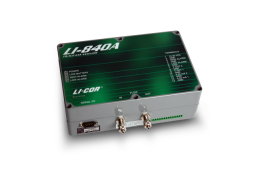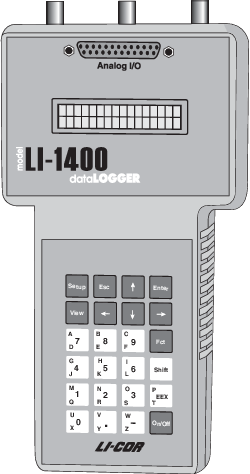The following example shows how you can connect the LI-840A to a datalogging device such as the LI-COR Model LI‑1400 DataLogger to collect analog data and convert to meaningful CO2 and/or H2O values. As mentioned earlier, voltage output from the LI-840A is linear; converting analog data into ppm CO2 or mmol/mol H2O simply requires multiplying the raw mV output by a conversion factor, which is dependent upon the selected voltage output range, and the maximum CO2 or H2O resolution available (set in software between 0-20,000 ppm). In general, the conversion takes the form:
3‑11
where V is the measured voltage, XF is the full scale value for CO2 or H2O output (entered in the Settings Window as the 2.5 or 5V value, up to 20,000 ppm for CO2), XZ is the zero value entered, and Vmax is the full scale DAC output voltage selected (5V or 2.5V).
For example, if the voltage output is set for 0-5V (Vmax), the zero CO2 value entered is 0 ppm (XZ) and scaled CO2 range is 2000 ppm (XF), and the measured voltage output is 2.9V, the equation would take the form:
3‑12
= 1160 ppm.
This general equation can be converted into simple multipliers, based on the two available voltage output ranges and the CO2 (maximum 20,000 ppm) or H2O (maximum 100% RH) range. These can be any value, depending on what is chose for the 0V and the full scale 2.5V and 5V DAC output values. Each multiplier can then be entered in the data logging device to convert raw voltage to CO2 or H2O values. Table 3‑1 lists some examples of values for this multiplier; simply choose your DAC output range in the second row, and then select the LI-840A CO2 range in the first column (the full scale value minus the zero value); follow across to find the appropriate multiplier. Note that this table assumes that the zero value (XZ) is zero; if it is not zero, the offset will need to be added onto the final result.
To calculate multipliers:
where XF is the full scale value for CO2 or H2O output, XZ is the zero or offset value entered, and Vmax is the full scale DAC output voltage selected (5V or 2.5V).
The LI‑1400 can be used to monitor voltage signals up to 2.5 volts with 76 microvolt resolution in real time and convert them into meaningful engineering units shown on the display. Alternatively, the LI‑1400 can be configured to automatically log these data over extended periods of time and later transfer the results to a computer for further analysis.
Access to the voltage channels requires the 1400-301 Terminal block. Voltage channels are designated by the letter “V” and sequentially numbered V1-4. The lead from LI-840A terminal #7 or #9 should be attached to one of the LI‑1400 terminals labeled V1, V2, V3, or V4, while the lead from terminal #8 or #10 should be attached to one of the LI‑1400 terminals labeled ↓ (ground). See the LI‑1400 manual for further details.
The following example shows how you can set up the LI‑1400 Datalogger to collect raw voltage output from the LI-840A and convert to CO2 values.
- Set the voltage output of the LI-840A for 2.5V output and specify the zero and maximum values for CO2 as described in DAC Output.
- In the LI‑1400, configure V1 channel as General for CO2.
- Enter a description, such as CO2.
- Set Math = Poly(nomial) and press Ent(er).
- Set description as desired, a0 = the offset (for scaled measurements), a1 = multiplier from Table 3‑1 (or equation 3‑13), and a2-a5 = 0. When finished, press Esc to return to the main configuration list.
- Set Oper(ator) = none.
- Enter a Label such as ppm for the units.
- Set Average=1 sec or as desired. CO2 will now be displayed on channel V1.
To log CO2 automatically:
- Set Log Routine to the desired log routine.
- Set Calc=Mean.
- To capture the minimum and maximum CO2 values, set MinMax accordingly.
- TCoef has no effect when Calc=Mean. It is used only when integrating.

